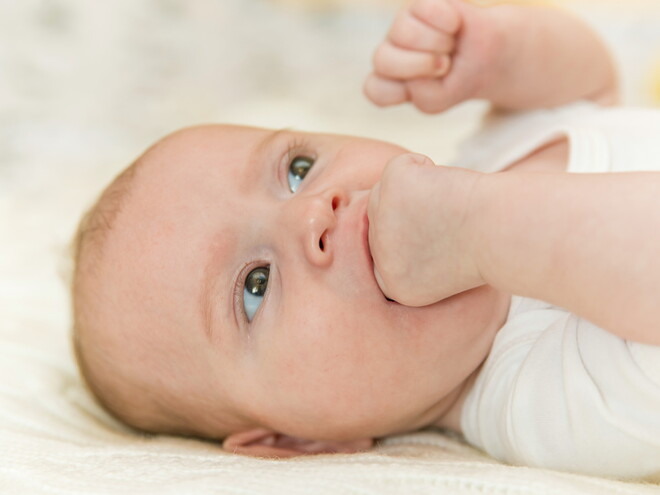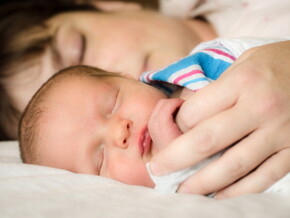
How can I make sure my baby sleeps well?
When will my baby sleep through the night? Is it normal for my baby to wriggle when sleeping? Then when my baby finally does go to sleep it's only for three or four hours, and as a result I don't really have time to rest. What can I do to help my baby sleep well?
Before being able to sleep like grown ups, babies brains needs to mature to be able to develop increasingly complex cycles, and above all to acquire the day-night rhythm to which we are so accustomed. For a baby, noises, smells and sensations are all different from those inside mummy's tummy and getting used to them may take longer for some babies than others. So how can you help your baby? By providing bearings (little ones love routine) and a lot of love.
Good sleep to grow well
Babies sleep a lot during the first few months, and devote their time almost exclusively to sleep! Sleep enables your baby to recover from the periods during which they are awake but also to grow and to develop normally. It is notably when a baby sleeps that the hypophysis (gland at the base of the brain) secretes the growth hormone.
A little like that of grown ups, a baby's sleep is organised in two alternate stages. The first is non rapid eye movement sleep. During this period of quiet sleep, lasting approximately twenty minutes, babies sleep peacefully, and growth hormone production is optimal. Then follows rapid eye movement sleep. During this phase babies are a little more restless and sleep is lighter with a number of short waking phases. It is a time essential to brain maturation. Between these two clearly determined phases are less marked intermediate sleep phases. It must be noted that babies almost always begin their nights with a restless sleep phase…
A newborn sleeps 16 hours on average (with extremes between 14 and 20 hours per day). Overall sleep quantity will gradually reduce over the years from 15 hours at around six and half months to 13 hours at the age of 4. Daytime sleeping also reduces in a similar way, 3 to 4 daily sleeps at around 6 months to only 2 at around 12 months, then to one hour only in the afternoon at around 18 months.
Sleeping through the night, often a source of worry for parents, depends on baby! Some babies sleep through the night as of the first few weeks whereas several months are often necessary for a baby's biological clock to abandon the 3-4 hour cycle for the 24-hour cycle. Baby gradually comes into sync with external rhythms: day-night cycles, regularity of meals, playing and exchanging with family. All help baby to adapt and to gradually stop waking at night!
A little helping hand to encourage deep sleep
Both inside the womb and during the first few weeks of life, your baby is not aware of the difference between night and day. The good news is that you can help your baby to adapt with these simple tips.
• Provide bearings! At night, make sure that the house is quiet and that the blinds or curtains are closed so that baby is in the dark. For the daytime nap however you can leave a little light on. Don't hesitate to go about your business as usual, a little noise will not disturb your baby.
• Establish a bedtime routine so that your baby understands that it is time to go to sleep. Changing your baby's nappy, putting their pyjamas on, singing a lullaby and having a big cuddle can be part of this routine. When your baby is a little older, you will be able to read a story together. Make sure that the nap routine is different so your baby doesn't get confused. A nursery rhyme, a little kiss and then into bed!
• Help your baby adopt fixed times. After feeding on-demand the first few weeks, begin feeding at set times.
• Make sure that the baby's bedroom is not too cold or too hot. The ideal temperature is between 18 ° C and 20 °C.
• Baby still sleeps in your room? To begin with this reassures your baby (and you!). You are near to one another and you don't have to get up to go and see if everything's alright, or to feed if you are breastfeeding. It is advisable not to maintain these arrangements longer than the first few months. Babies must be able to go to sleep alone early on in their own room. It is essential for the quality of babies sleep, and for your couple!
• Your baby cannot go to sleep without their favourite toy, dummy or without sucking their thumb? Don't take it away. It soothes your baby and helps them go to sleep. Your baby will decide when it is time to give it up. For the time being, it's a precious help for a quiet sleep!
• Baby cries when falling asleep? Leave your baby alone for a few minutes. Babies often need to shed a few tears to be able to fall asleep and this is natural. If your baby doesn't calm down, go and see them. They more than likely need reassuring.
Safely in bed, safety assured
Choose a cot that is up to safety standards and a firm mattress of the right size, to prevent your baby from getting stuck between the bed and the mattress or between the bars.
Babies sleep better on their backs. Their face is free and they can therefore breathe more easily.
Avoid any unnecessary accessories in the baby's bed (covers, pillows etc.). A sleeping bag is enough to stop a baby from getting cold. The same applies for cuddly toys. A baby's favourite toy is fine but a whole array of furry friends is unnecessary.
To decrease the risk of cot death, paediatricians recommend that babies sleep on their backs and that the room be kept at a temperature that's not too hot (18 - 20 °C is enough to keep your baby warm). Air the bedroom regularly and above all keep it smoke-free!
Opinion
Do babies dream?
Contrary to what one may believe, your baby's little mimics while asleep do not mean they are dreaming! According to some paediatricians children actually only dream from 3 years old , when they are old enough to recount their dreams.




















